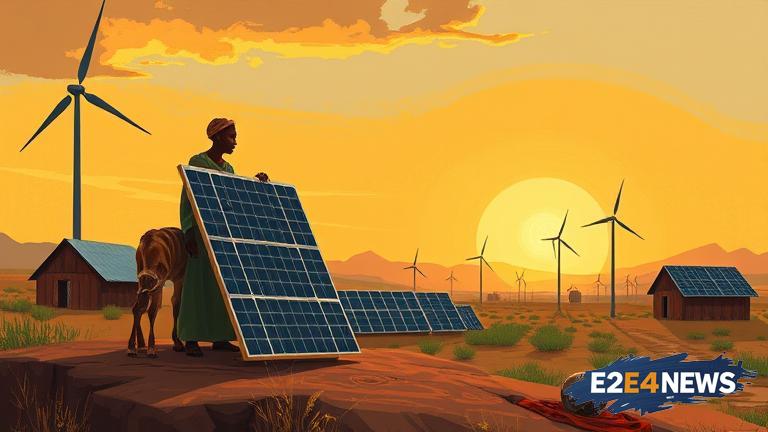Africa is undergoing a significant transformation in its energy landscape, with a growing focus on renewable energy sources such as solar, wind, and hydroelectric power. This shift is driven by the need to reduce dependence on fossil fuels, mitigate climate change, and provide energy access to the millions of Africans who currently lack it. The African Union’s Agenda 2063 has set ambitious targets for renewable energy adoption, aiming for at least 50% of the continent’s energy mix to come from renewable sources by 2030. Several African countries, including South Africa, Morocco, and Egypt, are already making significant strides in this area. For instance, South Africa has launched a series of renewable energy auctions, which have attracted significant investment and led to the development of numerous solar and wind farms. Morocco, on the other hand, has set a target of generating 52% of its electricity from renewable sources by 2030 and is investing heavily in solar and wind energy. Egypt is also pushing ahead with its renewable energy plans, with a focus on solar power and wind energy. The use of renewable energy is not only good for the environment, but it also has the potential to create jobs and stimulate local economies. In fact, a study by the International Renewable Energy Agency (IRENA) found that the renewable energy sector could support up to 24 million jobs globally by 2030. Africa’s renewable energy revolution is also being driven by the falling cost of renewable energy technologies, which has made them more competitive with fossil fuels. The cost of solar energy, for example, has fallen by over 70% in the last decade, making it more accessible to African countries. Furthermore, the development of renewable energy infrastructure is also being supported by international organizations and donors, who are providing financing and technical assistance to African countries. The African Development Bank, for instance, has launched a series of initiatives to support the development of renewable energy in Africa, including the creation of a $500 million fund to support renewable energy projects. The European Union is also providing significant support to Africa’s renewable energy sector, with a focus on promoting sustainable energy development and reducing energy poverty. In addition to these efforts, there are also a number of innovative financing models being developed to support the growth of renewable energy in Africa. For example, the use of green bonds and yieldcos is becoming increasingly popular, as they provide a way for investors to support renewable energy projects while also generating returns. The growth of renewable energy in Africa is also being driven by the increasing demand for energy access, particularly in rural areas where many communities lack access to electricity. Off-grid renewable energy solutions, such as solar home systems and mini-grids, are providing a cost-effective and reliable way to provide energy access to these communities. In fact, a study by the World Bank found that off-grid renewable energy solutions could provide energy access to up to 70% of the world’s off-grid population by 2030. Overall, Africa’s renewable energy revolution has the potential to transform the continent’s energy landscape and provide a sustainable and reliable source of energy for generations to come. With the right policies and investments in place, Africa can unlock the full potential of renewable energy and achieve a brighter, more sustainable future. The benefits of renewable energy are numerous, and they include reducing greenhouse gas emissions, improving air quality, and enhancing energy security. Moreover, renewable energy can also help to reduce poverty and improve healthcare outcomes, particularly in rural areas where energy access is limited. In conclusion, Africa’s renewable energy revolution is a critical step towards achieving a sustainable and prosperous future for the continent. With the support of international organizations, donors, and the private sector, Africa can unlock the full potential of renewable energy and provide a better life for its citizens.
